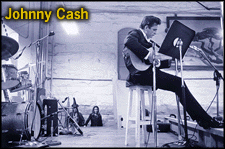
Oct 21, 1999
Behind bars
Johnny Cash at Folsom Prison
by Grant Alden
 Nineteen-sixty-eight proved a watershed year for Sun Records' two most
influential alumni. On January 13, Johnny Cash played his fourth concert at
Folsom Prison, producing a #1 album that would spend 122 weeks on the pop
charts and firmly establish the man in black as an enduring American icon.
Singer Presents ELVIS, the king's famous '68 "comeback" TV special,
aired December 3, 1968.
Nineteen-sixty-eight proved a watershed year for Sun Records' two most
influential alumni. On January 13, Johnny Cash played his fourth concert at
Folsom Prison, producing a #1 album that would spend 122 weeks on the pop
charts and firmly establish the man in black as an enduring American icon.
Singer Presents ELVIS, the king's famous '68 "comeback" TV special,
aired December 3, 1968. At Folsom Prison has stayed in print ever after -- paired, since 1975, in a double-album set with its follow-up, At San Quentin, which produced the Shel Silverstein-penned classic "A Boy Named Sue." That in itself is a remarkable accomplishment given country music's short-term memory. And, as Steve Earle writes in liner notes to the newly expanded edition, At Folsom Prison became one of a small handful of records that cut across generational, regional, and musical boundaries.
One wonders whether it still does.
Prisons in 1968 were radically different from today's models, or at least the public had a somewhat different relationship to the prison population then. The late '60s were, after all, a time of (what was perceived to be) radical foment. The notion that prisoners might be rehabilitated was still in vogue, as was the sense that many good men were unfairly sequestered within those hard walls.
Muhammad Ali, remember, was among the most famous men imprisoned for declining to fight the Vietnam War. Ali served his time among political radicals (revisit Eldridge Cleaver's Soul on Ice) and unfortunates locked up for selling $10 bags of pot to their friendly neighborhood narco agent. Future country star Merle Haggard was inspired inside San Quentin both by prison writer Caryl Chessman (a/k/a the Red Light Bandit, and author of three books from behind bars before his execution) and by a Johnny Cash performance there in the late 1950s.
The times, they have changed. The American body politic is no longer so confident of the possibility of redemption behind bars. As Steve Earle, who was by God redeemed behind bars, noted at his own comeback concert (filmed for MTV at the Davidson County Criminal Justice Center), country music is no longer a common language within the walls, even in deepest Tennessee.
And so At Folsom Prison, a surviving portrait of that barely remembered near-past, resonates with an almost 19th-century tone of honor, duty, and rectitude. Cash's deep voice has always been good at that, but this performance was and is special, both to the singer and to his audience. That was why Cash had lobbied Columbia for some years to allow him to record this album; he knew it would be magical. Both Cash's Christian impulse to witness and his rebel's compulsion to signify solidarity with the downtrodden come though the microphone clearly, even 31 years later.
Cash wrote the title song while serving with the Air Force in Germany in the early 1950s. And, no, he never shot a man in Reno just to see him die; the song, much like Bruce Springsteen's Nebraska paean to Charles Starkweather, came from a movie. But Cash had made the acquaintance of a few jail cells -- and more than a few pills -- by 1968, and his sympathies on At Folsom Prison are clearly, and profanely, with his audience, not with the guards. (This, incidentally, is where Cash famously flipped the bird to Jim Marshall's camera.) His traditional introduction, "Hi, I'm Johnny Cash," sets an oddly tender tone, and his songs reveal a sympathy and presumed intimacy with the inmates that probably would not be tolerated from a performer today.
And it is a dark concert, a singular set of deep, country blues songs. Count, for example, no fewer than six songs about men condemned to life, or execution: "Folsom Prison Blues," "Cocaine Blues," "25 Minutes To Go," "Long Black Veil," "Send a Picture of Mother," and "Joe Bean," not to mention the prisoner's suicide of "The Wall." This is not your brother's positive country music, and it is hard to imagine any of those tracks' making it onto today's country radio, even under cover of Chris Gaines.
There are moments of levity, of course; Cash asks for a glass of water, and one suspects the tin cup held stronger stuff, or perhaps that was pantomime. "The Wall" is followed by "Dirty Old Egg-Sucking Dog," and the show winds up with "Green, Green Grass of Home" and Glen Shirley's intimate "Greystone Chapel." Okay, not so much levity, but there's not much funny about prison, and the blues are not an uptempo beast.
The expanded At Folsom Prison is one of five discs opening Sony's new
American Milestone series -- it's joined by variously expanded versions of
Tammy Wynette's Stand by Your Man, Merle Haggard's Big City,
Marty Robbins's Gunfighter Ballads and Trail Songs, and Willie Nelson's
Stardust. None of the three added songs ("Busted," "Joe Bean," and "The
Legend Of John Henry's Hammer") on At Folsom Prison is revelatory, and
all the songs exist as better musical events in studio recordings. None of
which is the point: At Folsom Prison was an event, an act of charity, of
caring, a rare gesture of humanity.